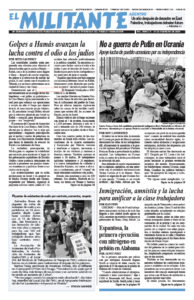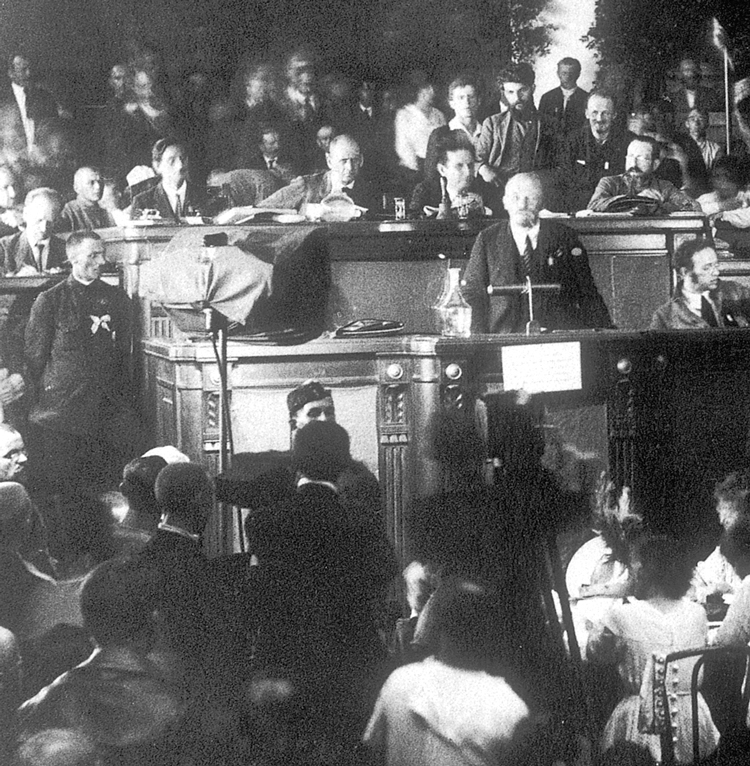One of Pathfinder’s Books of the Month for February is Workers of the World and Oppressed Peoples, Unite! Proceedings and Documents of the Second Congress of the Communist International, 1920, Vol. 1. The 1917 revolution led by V.I. Lenin and the Bolsheviks established a workers state in Russia that inspired millions of exploited and oppressed people worldwide and led to the foundation of the Communist International. The excerpts are from discussion on the national and colonial questions by Lenin and by Mariya [Ester] Frumkina, a former leader of the Jewish Bund who joined the Bolsheviks. In 1920 she became editor of the party’s Jewish press. She was purged in 1938 during the Moscow frame-up trials under Joseph Stalin and died in prison in 1943. Copyright © 1991 by Pathfinder Press. Reprinted by permission.
In this age of imperialism, it is particularly important for the proletariat and the Communist International to establish the concrete economic facts and to proceed from concrete realities, not from abstract postulates, in all colonial and national problems.
The characteristic feature of imperialism consists in the whole world, as we now see, being divided into a large number of oppressed nations and an insignificant number of oppressor nations, the latter possessing colossal wealth and powerful armed forces. … This idea of a division, of dividing the nations into oppressor and oppressed, runs through the theses. …
I should like especially to emphasize the question of the bourgeois-democratic movement in backward countries. This is a question that has given rise to certain differences. … We have arrived at the unanimous decision to speak of the national-revolutionary movement rather than of the “bourgeois-democratic” movement. It is beyond doubt that any national movement can only be a bourgeois-democratic movement, since the overwhelming mass of the population in the backward countries consists of peasants, who represent bourgeois-capitalist relationships. …
However, the objection has been raised that if we speak of the bourgeois-democratic movement we shall be obliterating all distinctions between the reformist and the revolutionary movements. Yet that distinction has been very clearly revealed of late in the backward and colonial countries, since the imperialist bourgeoisie is doing everything in its power to implant a reformist movement among the oppressed nations too. There has been a certain rapprochement between the bourgeoisie of the exploiting countries and that of the colonies, so that very often — perhaps even in most cases — the bourgeoisie of the oppressed countries, while it does support the national movement, is in full accord with the imperialist bourgeoisie, that is, joins forces with it against all revolutionary movements and revolutionary classes. …
The significance of this change is that we, as Communists, should and will support bourgeois liberation movements in the colonies only when they are genuinely revolutionary, and when their exponents do not hinder our work of educating and organizing in a revolutionary spirit the peasantry and the masses of the exploited.
***
I think that we should also take into account the national minorities, that is, minorities that do not possess a defined territory. I am astonished to see that the Second International’s mistake is being repeated here. We talk of territorial autonomy but do not take the national minorities into account. I would like the national minorities in the various countries to be taken into consideration, and I therefore propose an amendment to point 9.
First, however, I would like to remind those present of the experiences of the Communist Party and the Soviet government in Russia. The organizations of the Communist Party of Russia and the Soviet institutions have special departments and commissariats for national minorities that attend to the affairs of the national minorities and everything that concerns, for example, the Jewish question.
I propose the following. … “At the same time all Communist parties must, in their general policies and propaganda, lead a determined struggle against the bourgeois concept that this or that national majority has the exclusive right to control the territory it inhabits. Communist parties must oppose the conception of nationalist Socialist groups who regard the national majority as the absolute ruler and treat as foreigners the workers of national minorities without territory living in their country (Poland, Ukraine).
“If revolutionary groups give unconditional support to the independence struggles of oppressed countries inhabited by many peoples, without categorically demanding that the rights of national minorities living in these countries be realized in life (and these rights can be absolutely guaranteed only through the dictatorship of the proletariat), the danger arises that the previously oppressed petty-bourgeois masses may turn into oppressors.
“The Soviet regime and the Communist Party of Russia provide the working masses of all nations with the real possibility of cultural development, thanks to the detailed specialization of state administration (departments for education of national minorities, commissariat for the affairs of the nationalities, and so on). They set as their goal a truly fraternal coexistence of all nations. These experiences must be taken as a necessary basis for the national programs of all Communist parties.”
There is a tendency to regard all minorities without territory as alien, foreign elements. So it is in Poland and the Ukraine. It is important for all countries to note the experience of the Soviet government and the Communist Party of Russia, which give the toiling minorities of all nationalities the opportunity for full cultural development by placing at their disposal the necessary organizations, such as those to educate national minorities, and commissariats that champion the interests of the national minorities.
This example must serve all Communist parties as the foundation for resolving the national question.


